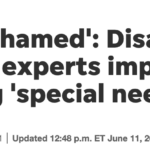In our first episode I explained that the Pamalogy Society’s mission is to fund and provide volunteer support for strategic high impact concept stage projects. Today I’m going to start revealing a project I think would have a maximum positive impact and would be the first endeavor that the Pamalogy Society should support. I call it a truth machine. I’ve listed it on my web site as among those that are the most important projects I can get off the ground before I die. Are you ready?
A truth machine? Really?
Yes, I’ll explain. I call it the CounterChecker. I should start by stating that this is a very emotional time for me. While this blogcast was being prepared, a war broke out between Russia and Ukraine. I should tell you up front that in my opinion, if the CounterChecker had been operating already, as I envision it, that that war would most likely never have taken place and the words “World War III” and “nuclear war” wouldn’t be trending in public discourse right now. Thousands of lives would already have been saved. If you get to know me well, you’ll learn that I can be very passionate about things, and that I don’t like violence. I think violence can almost always be prevented. But I hurt for those who will suffer from war. And I should repeat myself. I think the Counter Checker could have been vital in preventing all this.
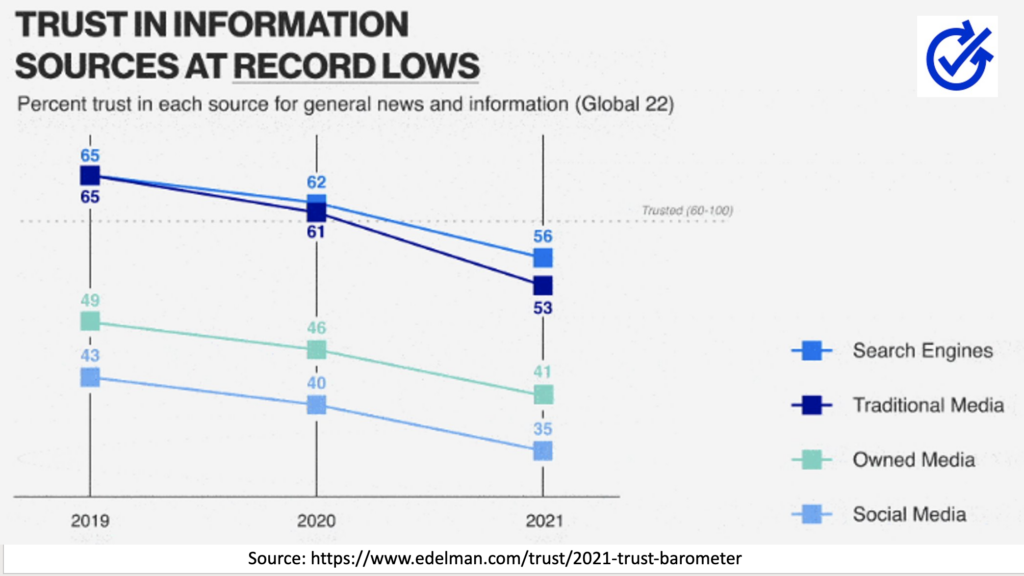
Let’s look at what the CounterChecker is as a platform. It is a fact-checking tool. I emphasize the word “machine” because unlike the existing fact-checking platforms, it’s not an organization so much as a system, driven by a rigid set of rules. Existing fact-checking organizations generally work for journalistic enterprises. They do research for those enterprises. They are more organizations than machines. The advantage of a machine is that it prevents the type of bias that is typical in journalistic organizations.
I’m using the word “machine” loosely. It doesn’t have polygraph hook ups. What I’m really going to describe, my truth telling machine, is a social media platform for researchers to create better fact-checks with. It’s a web site, with an app for Android and iPhone and tablets. It’s a gig opportunity for free-lance journalists and editors. But I’m going to call it a “truth machine,” because functionally, it’s designed to help us figure out what’s true and what’s not. And it’s nothing like anything you’ve seen before.
Let’s talk about that. First, the current art of fact-checking. What’s going on in the fact-checking industry and how is the CounterChecker going to utterly change it? Here’s a little history.
Probably the best known fact-checking organization is Snopes. Snopes started out looking into urban myths. Was there really a sighting of the Loch Ness monster? Does Big Foot really have a family now? Where did those pictures come from? Was Bill Clinton really visited by Martians? You know the sort of thing. Somebody had to check into stories like that to see if they were true. Snopes was the go-to place to figure stuff like that out. Was that email I just received true?
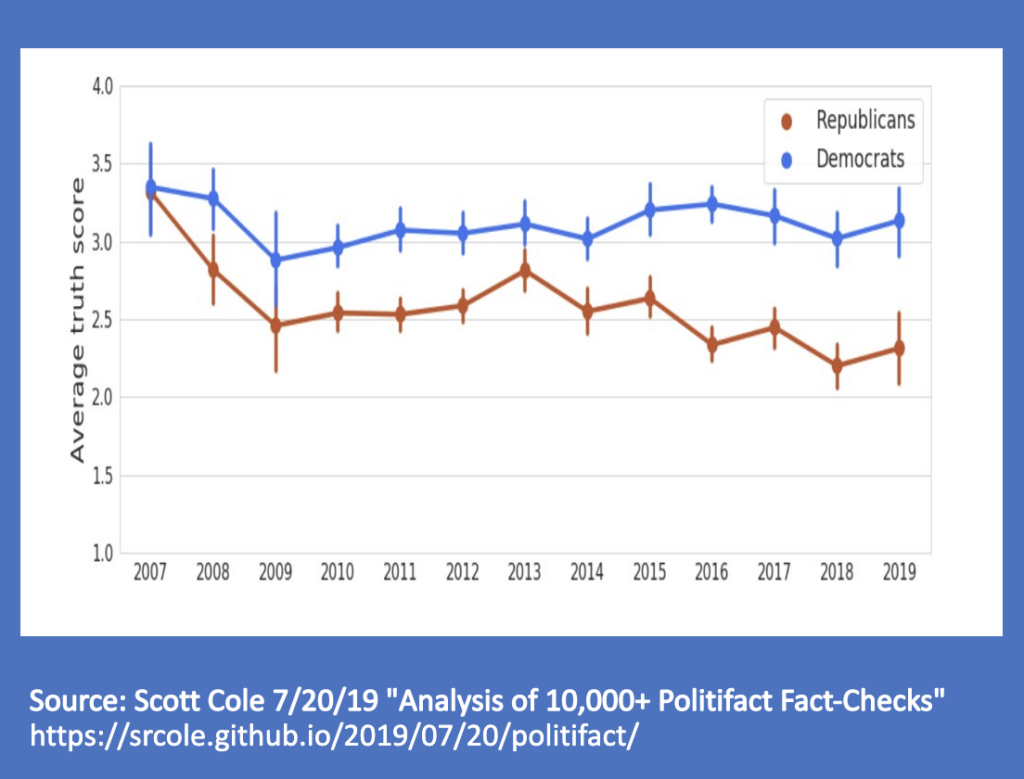
Then one day, politicians got a hold of Snopes.. And that created a problem. If Snopes said something that helped the other side’s political narrative, presumably, depending on which side you asked, it wasn’t because Snopes was telling the truth. It was because Snopes was politically active and biased itself. If you were a conservative, you were upset that Snopes claimed to be started by Republicans but really seemed to be working for Hillary Clinton’s legal defense team. If you were a progressive, you were wondering why Snopes wasn’t exposing systemic racism, gender disparity and oppression. The left thought Snopes was biased to the right. The right thought it was biased to the left. No one trusted it for politics.
Before long, Snopes left Facebook and gave its political fact-checking business to a few other organizations approved by the International Fact Checking Network, known as the IFCN, whose focus was primarily political. You may not be aware, but only IFCN endorsed fact-checking organizations are utilized by Facebook to block content based on their fact checks. They use an algorithm, also used by Google, called Claim Check Review. Google uses the algorithm, to place only what it considers factual at the top of search results. It determines what it guesses are trusted sources and authorities. Few people, especially Americans, ever search through page two of a search result. This gives the IFCN a great deal of control over what we see and hear about.
This is a good thing. Right? That means misinformation is being suppressed. Misinformation is bad for people. Isn’t it?
Yes, of course! In fact, I believe it is misinformation that led us to the current crisis in Ukraine, and that is just one example, but part of the problem is not just misinformation, it is suppression of critically important facts in favor of one political narrative over another. The current art of fact-checking is part of the problem. For one thing, it is not trusted. It claims to be unbiased but its bias is measurable. And since it is tied together with big tech, trust in big tech is declining as well.
Conservatives, in particular, are reluctant to believe what fact-checking organizations have to say. The demographics here are quite fascinating, so I’m including some charts and demographic breakdowns on our Pamalogy blogcast transcript . Women, for instance, tend to trust fact-checks more than men.
Respect! … but is that trust merited?
In July of 2019, a programmer named Scott Cole scraped every fact-check that Politifact had ever done since they started business in 2007 and tabulated the scores. Automated web scraping tools help data analysts capture information from web pages that are no longer published, or deeply buried. Like most people, Cole assumed he could trust Politifact and expected to show that it was unbiased. However, the data he collected showed that Democrats consistently scored higher than Republicans on truth scores. In fact, year after year, Republicans, got lower scores and Democrats got higher scores. It wasn’t even close and the difference kept widening.
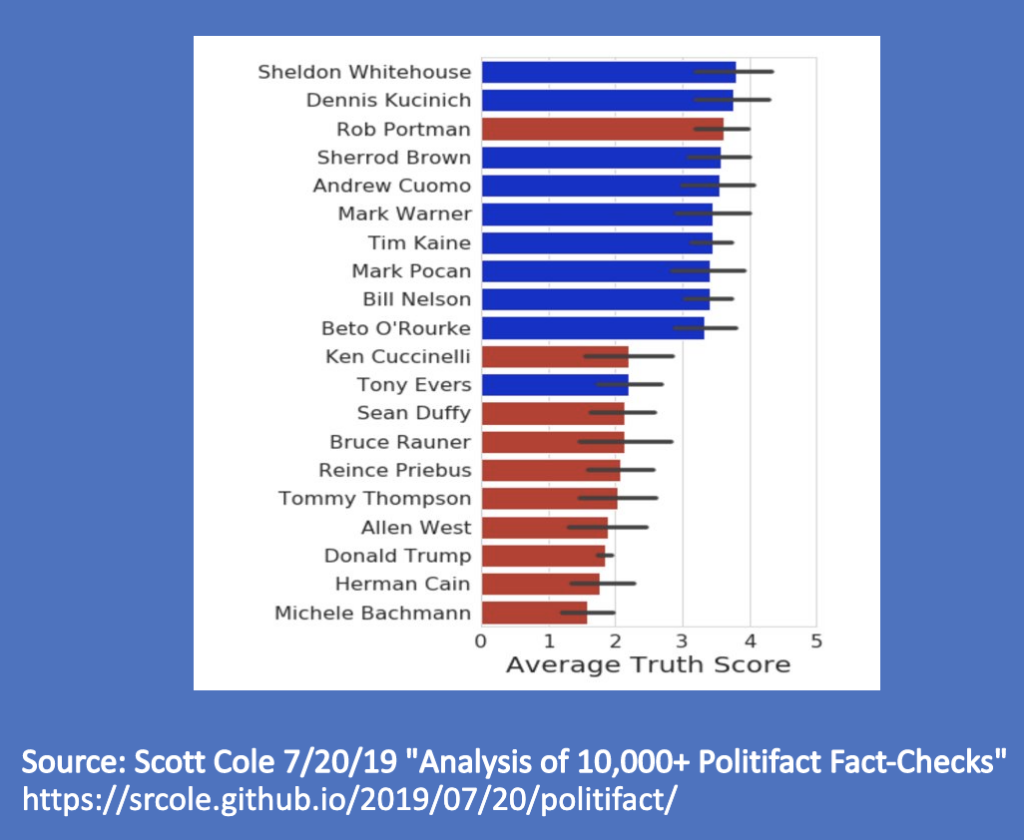
This could mean many things – probably some combination of them. It could mean Republicans really do lie significantly more than Democrats overall, more so now than ever before. It could mean Politifact is being selective about what it reports. It could mean that Politifact itself is being less than honest and fair, consciously or subconsciously because of the general leanings of its staff. And it could be because its editors find that exposing lies sells more newspapers for the Tampa Bay Times and its syndicates. It could be because it gets more attention through those vital and very lucrative Claim Check Review algorithms that pop up every time someone says something officially incorrect or debatable on social media. It doesn’t all have to do with bias. Money is a driver too. Whereas, most companies pay Facebook to advertise, Facebook actually pays Politifact literally millions of dollars as a content provider. It doesn’t matter whether Politifact is a non profit, or that it was recently acquired by the Poynter Institute. It’s still a revenue source.
Now, somewhere in the midst of all those most likely explanations is the truth and your opinion about it may be right or wrong. Conservatives look at this reporting and are not likely to conclude that it is because Republicans lie more than Democrats do. Democrats may well think so, but Republicans definitely wouldn’t.
The result of all this has been a general decline in how the public perceives the fact-checking business. Politics as usual is destroying public trust. We can’t trust fact-checking organizations for a straight story and we can’t trust big tech generally.
The second bad thing, I think, will stem from this and it’s already happening. We resort to echo chambers.
I’m sure you’ve heard of an echo chamber before. It’s a place where you only hear your own voice. You surround yourself with a community that agrees on certain issues. Anything contrary to the echo chamber’s narrative, comes from those liars in the other echo chamber – those poor, poor Kool Aid drinking fools. Those in the one chamber don’t venture to the other much at all because it is uncomfortable. It’s daring, even painful to do so.
It means removing the comfort of acceptance from a group we may have enjoyed and gained much from, maybe even been paid by. It may mean removing an ego-boosting sense of personal pride and self-worth. It may mean we have to face the fact that so much of what we’ve worked for and spoken about was actually wrong.
Let’s do a self-evaluation. Do the causes I associate with serve as a substitute for my own merits in deserving self-respect? Where do I get my sense of self-worth? Is it from the groups I associate myself with? Would I still be able to love myself if I discovered the groups I’ve supported have been wrong?
There is a lot behind what goes into why we associate with various groups. When these disparate groups have conflicts of ideas, the results can be very dangerous to us as a society. It’s the sort of thing that results in riots and insurrections. And unnecessary wars that affect millions of lives.
As I see it, ignorance of what is going on in opposing echo chambers is at the heart of the problem and the current state of the art of fact-checking is enforcing the problem rather than solving it because it hasn’t escaped the political motivation that it claims it has.
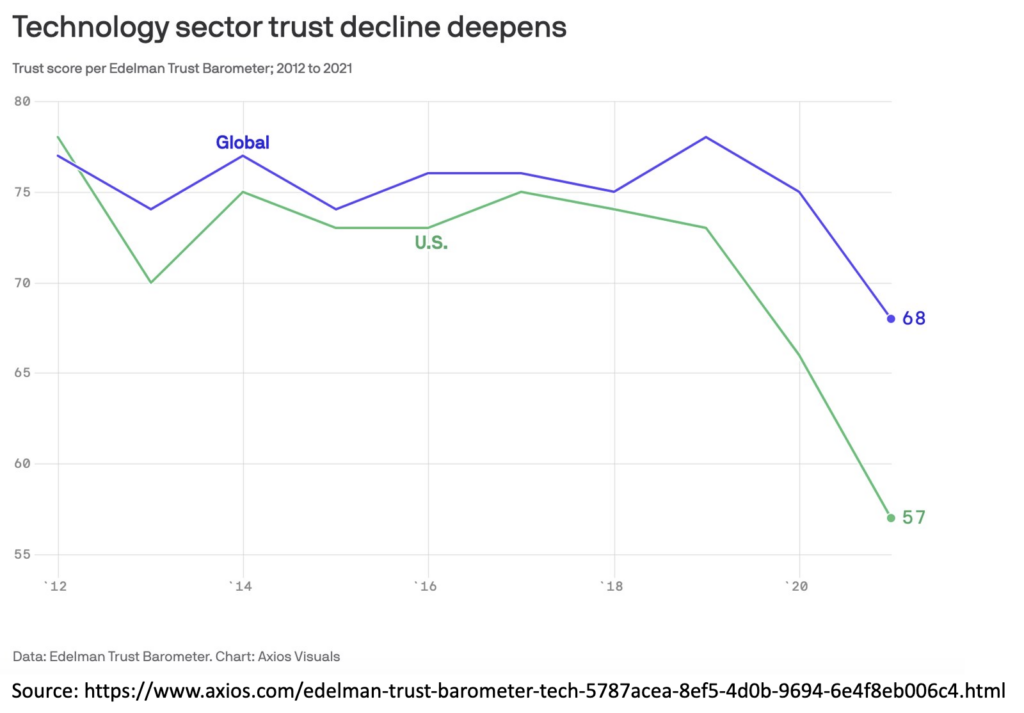
From a conservative’s perspective, the system has been rigged. And from what I can see, they have good reason not to trust it. All they have to do is go to the Poynter Institute‘s web site and see what it takes to get an endorsement from the IFCN. While Duke Reporter Labs now lists over 300 fact-checking organizations worldwide, fact-checking is a huge emerging business, make no mistake about that, there are only 29 IFCN endorsed fact-checking organizations, last I checked. Is this a sort of market consolidation effort?
Let’s think about that. Have you seen how the IFCN endorsement process works? A seven member panel checks out applying organizations – just seven people. And who are those seven people? Well, the two Americans of the seven are Angie Holan, of Politifact, and Glenn Kessler, of the Washington Post Fact Checker. If these two happen to identify with the same echo chamber, they only need two other votes from the other five members to approve or disapprove an applicant fact-check organization. Almost invariably, they’ll build around their own comfort zone. Won’t they?
Given how fact-check authority is used by big tech, these two people wield a lot of power over the information we receive. And the power of suppression only begins there. Once the facts are established by this handful of cherry picked fact-checking organizations all quite possibly residing in a single echo chamber, the authority going to the corresponding group narrative is used by groups such as Good Information, Inc., and the Aspen Institute to work with government intelligence to root out those who disagree.
The Aspen Institute’s 16 member commission on “information disorder” is opposed to dialog with those with counter-narratives. Its justification is given in the lead for its eighty page report – “information disorder is a crisis that exacerbates all other crises.” Climate change denial makes climate change worse. Pandemic denial, makes pandemics worse. Denial of racism makes racism worse. And the list goes on. Now which echo chamber focuses on these specific issues as part of its political platform? It’s not hard to see which political party is dominant in the control of information here in the world of fact-checking. The result is lost trust.
But the problem is even worse than that. The commission doesn’t want a discussion. They want to treat those who see things differently as potential threats to national security. They aren’t just wrong. They are dangerous. Do you see where this goes?
Fundamentally, then, here is how the conservative who distrusts big tech is going to look at this. They are going to say the Washington Post and the Tampa Bay Times are left-leaning organizations that have a long-standing tradition of undermining conservative political causes and candidates through their choice of what they report and how they report it. The fact-checkers merely lend an air of authority to their bias. The way conservatives see it, the whole fact-check thing is a crafty ruse. It’s good marketing, but it’s a sham. What conservatives have always suspected, (that the media is biased and big tech can’t be trusted), is grounded in this basic reality. And now the FBI is involved, profiling them for supporting Donald Trump. This is not something that makes for peace.
And it isn’t just a Donald Trump thing. Trump, after all, supplied the javelin missiles that destroyed the Russian tanks, emboldening the Ukrainians to fight a war they were ultimately going to lose, resulting in a new cold war, a worldwide economic crisis, and the misery, starvation and death of many people not just in the Ukraine. In my opinion, and I could be wrong, all of this could have been prevented, if only the powers that be, those controlling these political narratives, were kept in check by a truth machine. A truth machine would provide a certain healthy freedom of speech. It would provide each side of every argument, not just one side or the other. We used to refer to this as a Fourth Estate. We had three branches of government and we had something like a fourth branch in a free press. The age of big tech ended free speech and the fact-check industry has served as part of that technical enterprise.
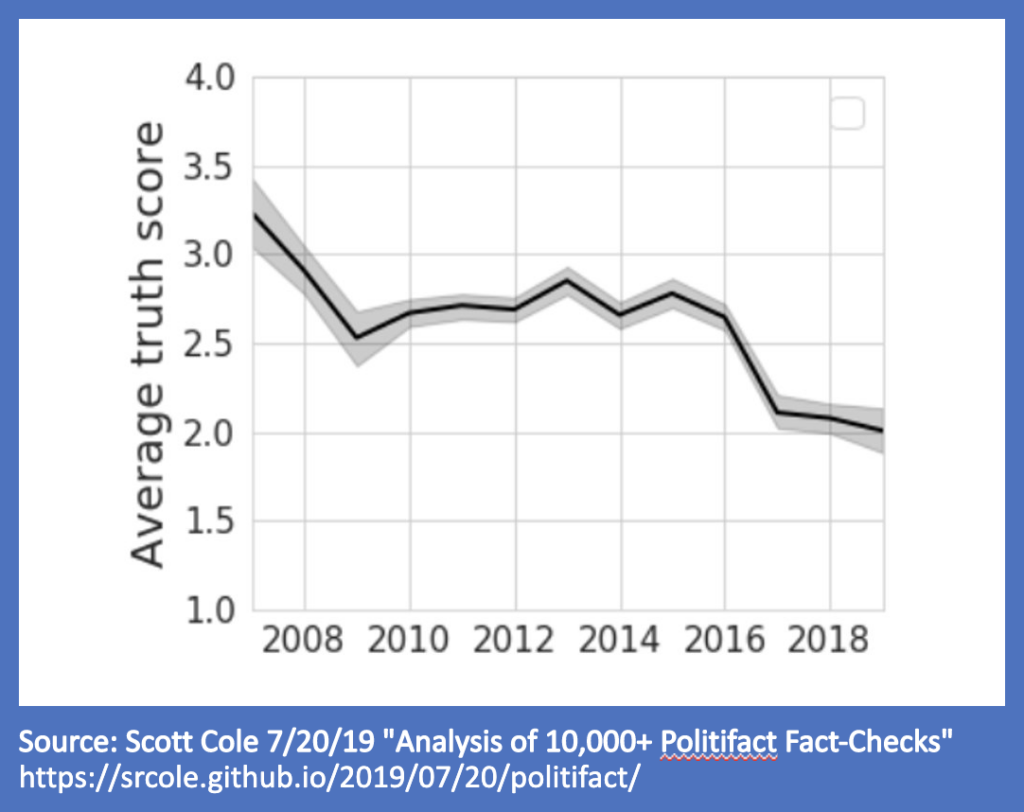
Now you may well believe that the fact-check organizations can be trusted. You may well believe that Glenn Kessler and Angie Holan are truly independent and research fairly. And you may be right, but you will have to admit that most conservatives wouldn’t agree with you.
So what if I told you I could fix this? Suppose there was a way to convince conservatives to trust the fact-checks? Let that sprocket on your top hat spin a little bit! …
.. what you need is better truth detection machine – one that vets information right in front of them.
So that is what I invented. I call it the CounterChecker. Instead of just watching things go from bad to worse, I’ve designed a new platform that doesn’t assume truth is all contained in any one echo chamber. It depressurizes each chamber by connecting them with an airlock.
It’s just a metaphor. No one is trapped inside an echo-chamber. What the CounterChecker actually does is it addresses an obvious flaw in the way things currently work. Let’s look at that.
The way fact-checks are currently done, some question will come up that helps or hurts a particular political candidate or cause. For instance, climate change. It is very common for climate change experts to show evidence that proves climate change denial is wrong. In 2017, for instance, a fact-check organization specializing in climate change, ClimateFeedback.org, was approved by the IFCN, having been created for that purpose. The way it works is that a claim is made suggesting the basis for climate change assumptions is wrong. And then that claim is disputed by the organization. Typically, this ends the discussion because there is some amount of research data to back up what the organization’s expert has said. End of story. There’s your fact.
The problem with this methodology is that there is no cross-examination. What the CounterChecker does differently is it turns fact-checking into a dialog between researchers that addresses as many points as needed to fully examine a question. Minority and dissenting views are given a voice. The result is that the reader not only hears whether something is right or wrong, but can find out exactly why by searching through the dispute.
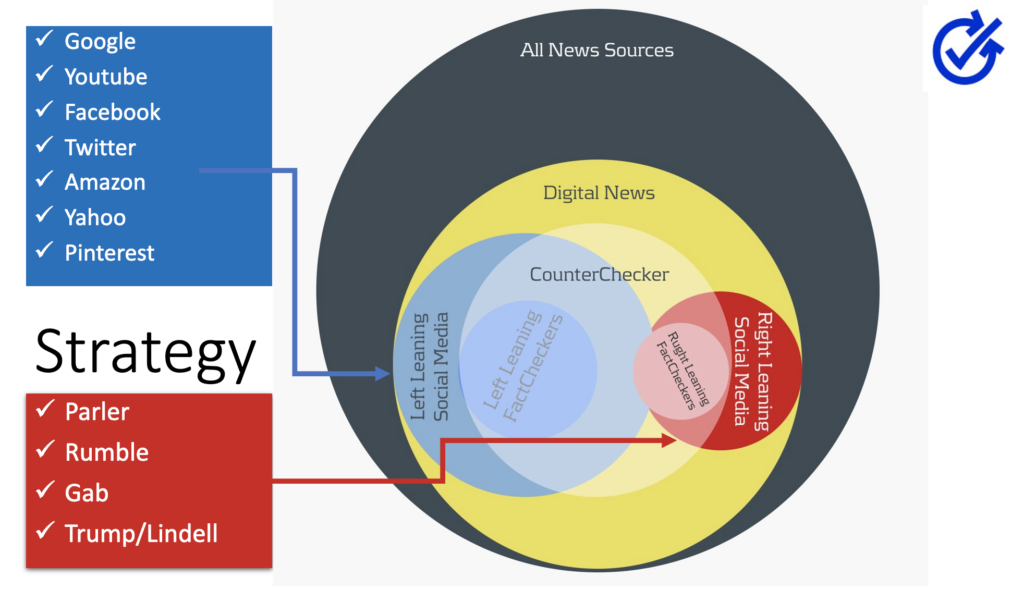
Now I need to clarify up front that the voice that dissenters have on this platform is not an opportunity to spout misinformation and get equal air time. The system is highly sophisticated. If any facts are presented, those telling the truth may refute them on the spot with the evidence they have. It is not a shouting match. It is a process for checking facts and keeping each side accountable.
The CounterChecker offers an indisputably objective scoring system. It is based on the number of points made and the number of times those points are violated, as counted by the dissenting team. This produces objective scores for articles, scores for researchers, scores for teams of researchers and scores for fact-check organizations.
In the coming episodes, I’ll introduce you to some basic epistemology. Epistemology is a philosophical term referring to the study of knowledge. How you know things and what knowledge is both matter when saying whether something is a fact. The CounterChecker’s scoring system will be designed and tested by philosophers, making the scoring system indisputably fair.
You’ll like it. The way it is designed, facts are easily searched because repetitive information is systemically discouraged through a system of penalties issued by the opposing researchers and their teams. We call this a Hegelian dialectical methodology. When it is married together with smart indexing and topical search, any fact can be looked up with just a few clicks and digging deeper leads to the related disputes.
Think about it. In the current way of fact-checking, a highly funded organization, which is trusted among journalists, but not necessarily by the population as a whole, pays journalists who tend to agree with them ideologically. While this is great for selling news because it targets specific echo chambers who will pay for what comforts them, it is not great for providing just the facts, and it is not great for building trust or uniting a divided country. And it can be very dangerous for humanity.
If our goal is to determine a common set of facts that we can all agree on, instead of each echo chamber having its own alternative facts, we need a paradigm shift. Claiming to be unbiased is easy to do. But what measures are in place to ensure it? The CounterChecker does this by providing an effective system, a platform – not the researchers. It invites researchers selected by opposing teams of thinkers to hash out their ideas on the platform. It doesn’t treat an opposing view as an equivalent view. It checks both the orthodox and unorthodox viewpoint through opposition. Imagine a court room only providing a prosecution or a defense, but no cross-examination. That would be crazy. Wouldn’t it? So, why do we allow that with our fact-checking?
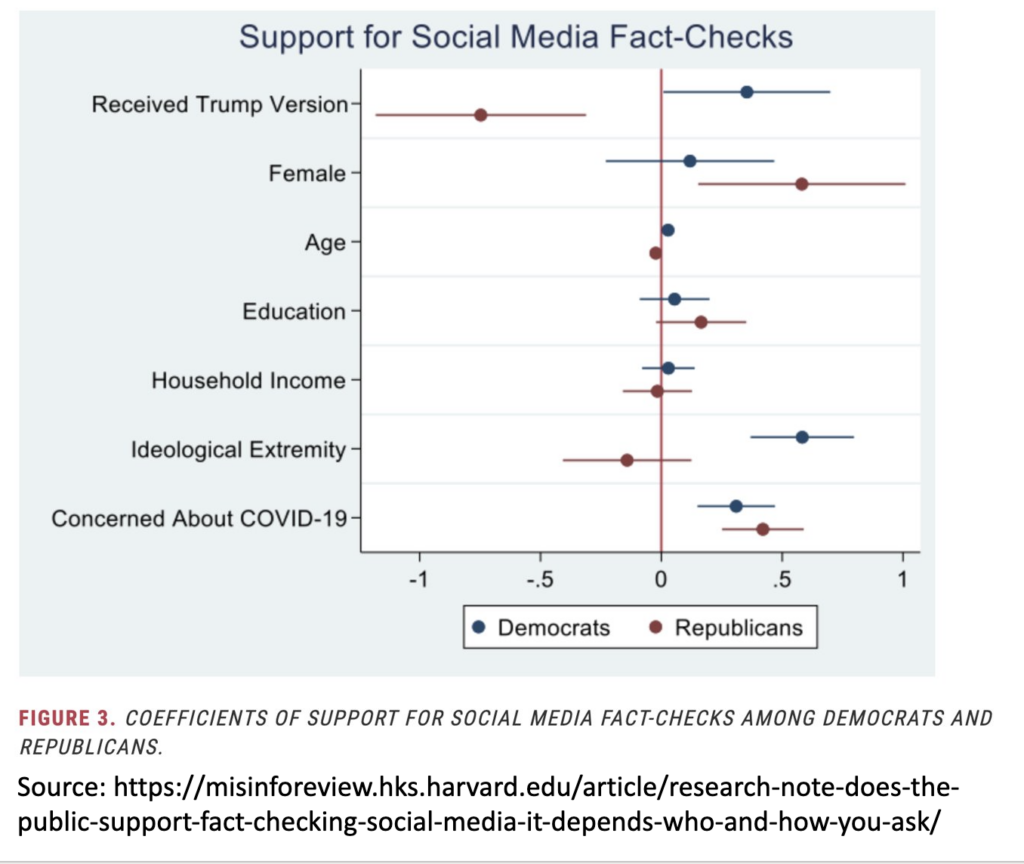
Here’s how it works: the head of think tank A and the head of think tank B, political arch enemies, select their own teams of researchers to use the platform and dispute one another’s claims. The platform itself issues objective scoring criteria. The machine is the only thing we can all admit is indisputably unbiased. No matter what ideological view a person holds, they can’t disagree with the inherent fairness of the machine itself. The platform is a machine with rules that apply equally to each side of any dispute.
Of course, the CounterChecker doesn’t have to be limited to politics. In fact, in beta testing it with philoosphers, the orginal content is designed to resolve questions like whether DesCartes had a soul or Nietzche was right that God was dead. Suppose I’m having an argument with a friend about how many planets there are in the galaxy, or whether there really are miracles? What about who is the best NBA player of all time? Teams of experts come in all shapes and sizes. Politics is just one area among many where disagreement abounds.
And here’s another problem and the reason why I’ve chosen the philosophical community to help me design the CounterChecker. How do you separate opinion from fact? What’s the difference between objective and subjective criteria? What about if there are three pieces of evidence for and two against an idea? Have you figured out the truth? One of the other features I like about the CounterChecker, having seen the design, is how it separates facts from opinions and beliefs. Another is the way it is designed to resolve disputes on any subject – not just politics. It may come up with the answer “I don’t know” a bit too often for most peoples’ taste, but I suppose that’s the price of being fair. And more than just fair, it is designed to be informative.
I won’t go into the later iterations of the technology here. I told you I would talk about how much this machine would cost to build and why I thought building it would probably be the most important thing I could do before I die.
If you follow the Pamalogy Society blogs and podcasts, you know that truth is what the Pamalogy Society is built on. It questions everything. If we can manage to leave our pride to the side and trust the exploration of truth, admitting it when we find out we’ve been wrong, then maybe there’s hope for us as human beings. We may just get through this division and find solutions for peace.
Now on a more strategic and practical note, if the Pamalogy Society sponsors the CounterChecker, making it possible, then the CounterChecker will likely disclose the fact and link back to it. Personally, I think people are very much interested in facts. Every news source certainly is, but so is science, sports, religion. Knowledge is super important to just about everyone. And that means the CounterChecker will, in all likelihood, link back to the Pamalogy Society, from just about everywhere. Call it a marketing strategy. It’s branding. Next time we have to ask for money, maybe our name will be more familiar. It’ll be easier to do. This is what I meant when in our last episode I spoke of maximizing awesomeness by funding and providing volunteer support for projects one at a time strategically.
For me, making a list of things I’d like to do before I die, to maximize the world’s awesomeness is important but it has to be achievable. A good strategy will be one that makes each idea build on the last. That’s why of all the projects listed at JamesCarvin.com, I think the CounterCbecker needs to come first.
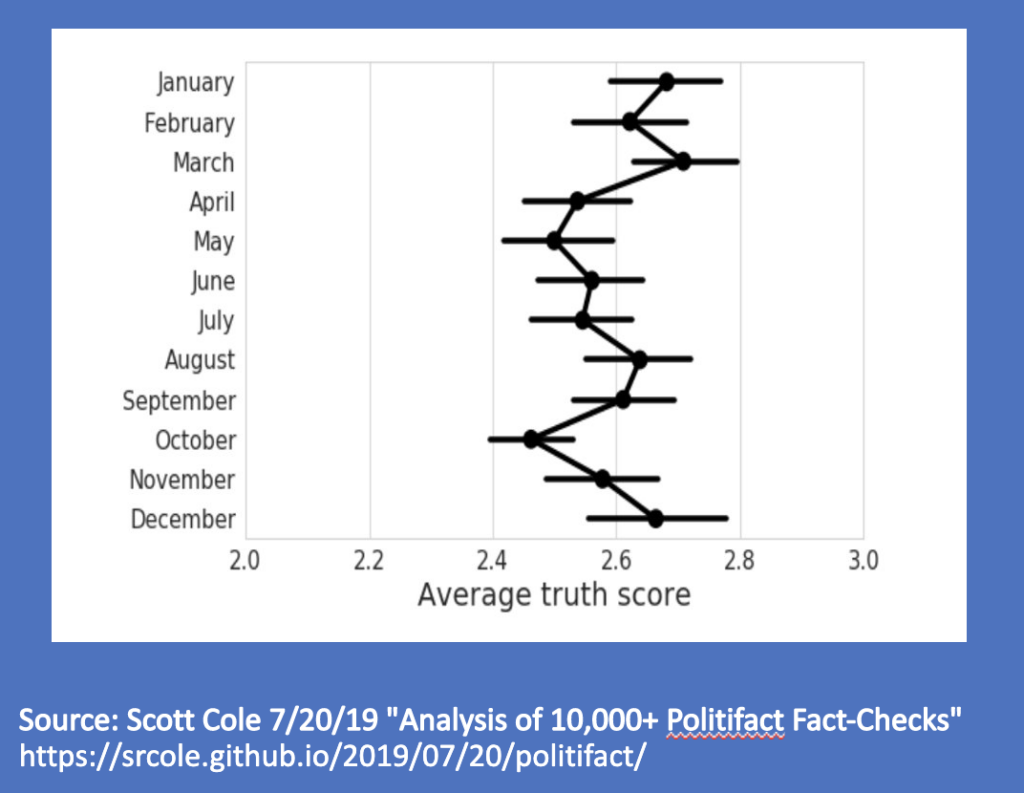
So, back to the truth machine: it stands to reason that if grant monies become available for better journalism and the elimination of disinformation in the coming days, that the CounterChecker is the best choice for achieving that goal. An estimated $1.4 million in research and development funding is needed for the project, which is expected to take nine months to complete, so you can expect the Pamalogy Society t0 make an appeal in the coming days to those granting organizations. The Pamalogy Society will begin voting on the first projects it will be funding very shortly. Expect an announcement soon.
Now before I say goodbye until next time, let me address a funny sort of elephant in the room. You may have heard I was planning to ask one of the organizations funded by George Soros for a donation. When it comes to who we can accept funding from, there are certain limits. First, a 501(c)3 public charity can’t accept funds from a political candidate or political advocacy group. I’m sure you know that. We also have to avoid any conflicts of interest, and there are conflicts of perception to think about, as well.
Did I really say George Soros? What will conservatives think?! They’re likely to suppose that if the Pamalogy Society accepts funds from George Soros, or any other source with a history of support for progressive causes, that in some way the Society would be beholden to support their viewpoints.
That works two ways. Others have suggested that progressives like Soros would never support a platform that permitted objections to progressive “facts.” The views expressed in the Aspen Commission and Good Information, Inc. might show an objection to two way communication. I’ll address that in Episode 3, where I want to talk about why freedom, including freedom of speech, is something we need to appreciate for all that it is. In our next episode I’ll talk more about the work of this commission.
But I have a question. It’s something of a challenge. Why should someone like George Soros object to funding the CounterChecker – a vehicle that allows those who probably disagree with him, to have a platform to communicate, if he believed his own views would prevail? Why wouldn’t he see the “platform only” approach as an opportunity to prove he’s fairer minded than he’s made out to be? I don’t think he would refuse it. I think he would see it as a good solution. He would see it as an opportunity.
This is why I like the CounterChecker as a truth machine. It doesn’t really matter who funds it. It’s just a machine. It doesn’t have any opinions or agendas. In the end, the public sees both sides of every story, not just one and they see why certain arguments fail. The conspiracy theories of conservatives are weakened by the facts. On the other hand, if he doesn’t fund it, the conservatives will assume it is because he doesn’t really care about facts if he can’t manipulate and use them to his advantage. I don’t think he would do that.
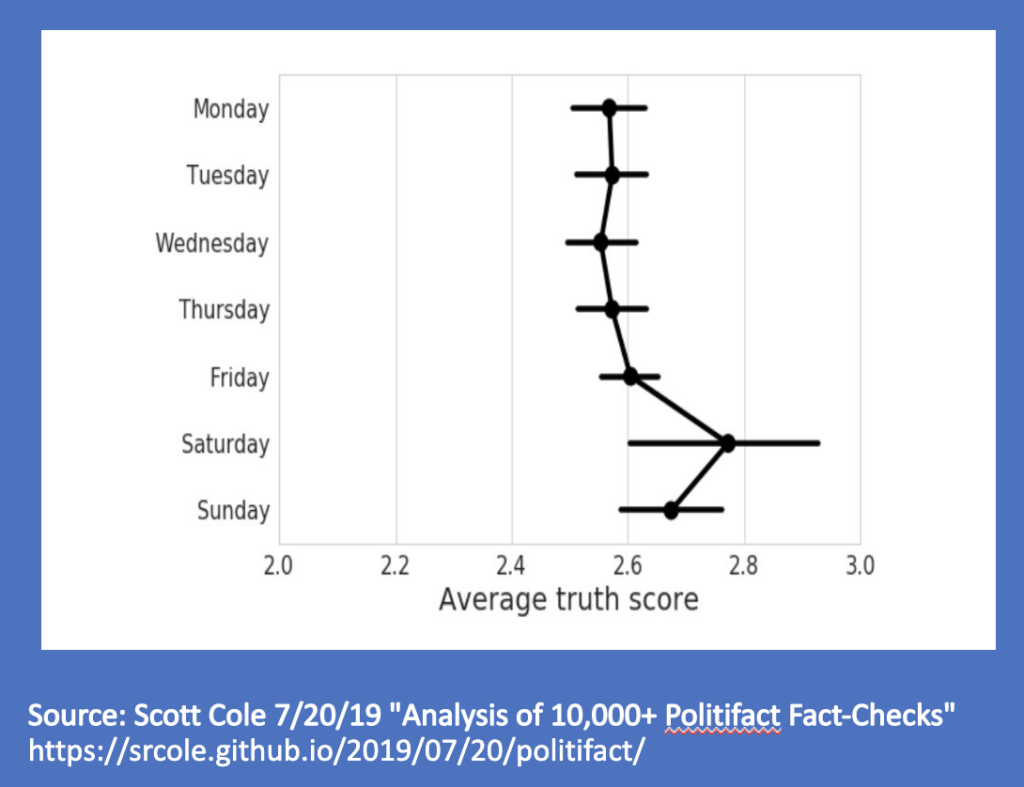
This brings me to the last aspect of the Soros-factor. And I want to be sensitive. Whenever someone mentions this man’s name, certain outlets claim it is antisemitic to do so. I’ve dared mention his name, so I unfortunately must clarify that for the record, I have no particular opinion about Jewish people. I am familiar with various forms of Judaism. There is a lot about Judaism I appreciate but I’m not a Jew myself. And I haven’t quite learned why this became an issue with George Soros.
My personal experience with Jewish people has not been negative. Generally, when Jewish people have been around me, it has been the Jewish person calling attention to their Jewishness, rather than me. If they weren’t wearing a yarmulke or a phylactery, I wouldn’t know if a person was Jewish unless they told me. I can’t personally remember any time where I ever brought the subject up, outside of a discussion of asking questions about religion with someone who seemed to want to talk about it. I don’t know whether George Soros is a Jew by heritage only, or whether he is an active believer. I’ve heard he was an atheist but that may really just mean he’s an agnostic. I know more about what he has done as a political activist than I do on is thoughts on religion.
All that said, let’s suppose I was able to convince an organization like the Aspen Commission, which is working to diminish disinformation, or Good Information, Inc., which is being funded by Reid Hoffman and George Soros to support journalistic enterprises that are fact-check based, to fund the CounterChecker. The people behind these enterprises, Katy Couric, Rashad Robinson and others, have publicly opposed equivalency media. That is, media that gives an equal voice to opposition, when fact-checks have shown one side is a source of misinformation. Assuming these institutions will work together with big tech to achieve those ends to some extent, I would have to show that the CounterChecker is not just showing balance, it is offering a better process for determining facts.
Indeed, that’s the case. So assuming I succeeded, the problem is not George Soros. It is the question of whether conservatives would participate, knowing George Soros had a hand in funding it. But if conservatives reject the CounterChecker, that is like the horse biting the hand that feeds it. Similarly, the CounterChecker would give the Chinese and the Russians a voice. That’s what freedom of speech does. Conservatives might not like that either. Neither would progressives. Too bad. Facts are facts. And they can be refuted using the tools the platform provides.
All this is to say, that the platform only approach is clearly the best approach. It remains to be seen who will come forward to support it. I want to do all I can to make sure the vehicle is available. That’s my part. The rest is up to the powers that be. Let’s see what they do with it.
Next time, I’ll talk about freedom, including freedom of speech – why it matters, and how to use it. In later episodes, I will describe how the process of funding projects works, and what it is we hope to do to incubate worthy programs, like the CounterChecker and like the other programs listed at JamesCarvin.com. Plus, if you’ll submit your own concepts, maybe we could talk about the things you think would make this world more awesome too.
Ciao!
URL to share this transcript page: https://pamalogy.com/2021/11/26/a-truth-machine/
URL to share the podcast: https://player.captivate.fm/episode/521b1a52-276e-4fbc-9824-69e5422c937c
URL for the audio file: https://podcasts.captivate.fm/media/8660b70d-f6f6-40b2-a60f-14c1f33d7d8a/episode2-truth-machine.mp3
Previous: What’s Pamalogy? Incorporation
Next Up: Words Hurt


